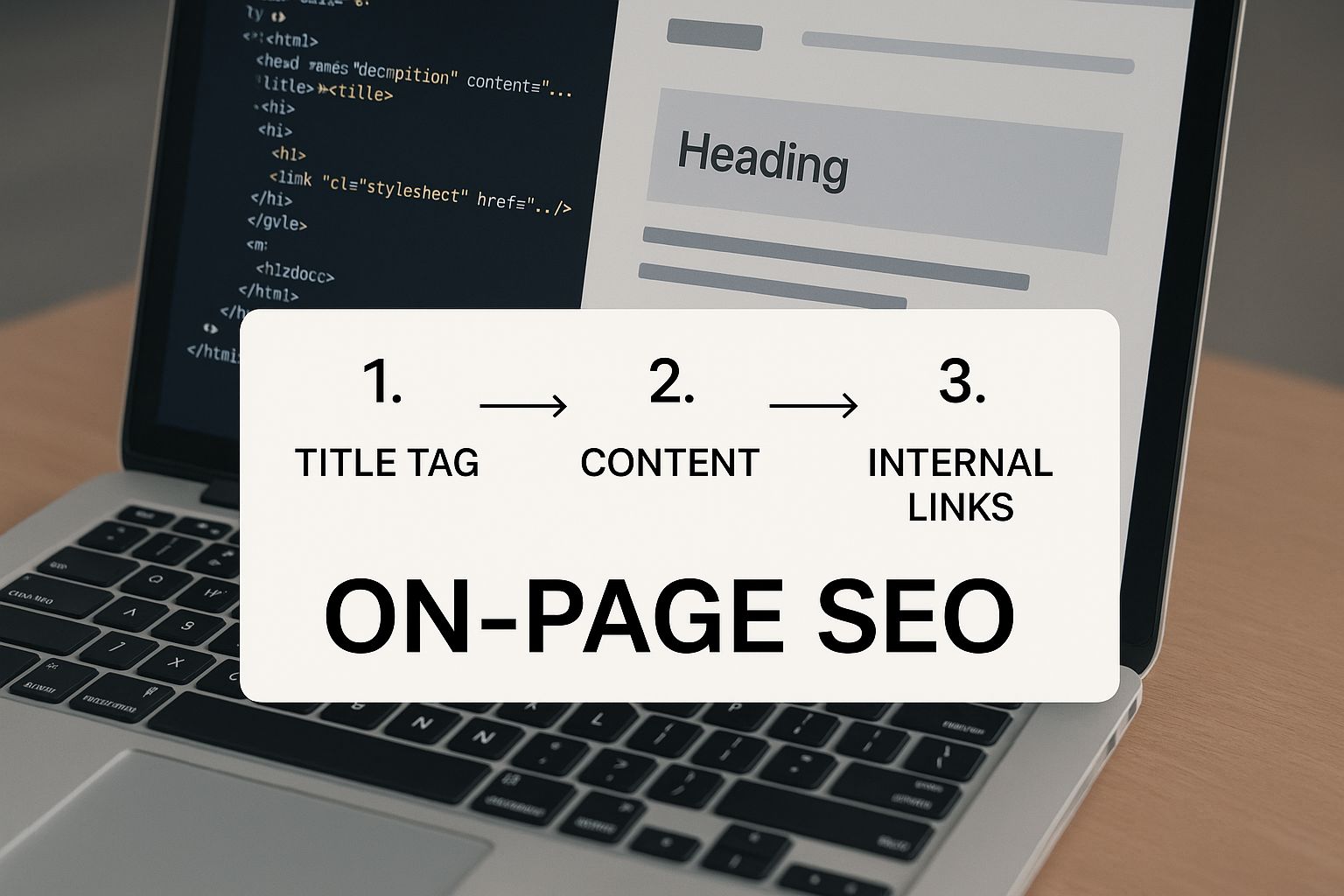Want to improve your Google rankings? It's about more than just a few tweaks. You need a solid, balanced strategy that focuses on three key areas: creating genuinely helpful quality content, maintaining excellent technical website health, and methodically building your site's authority.
This means you’ve got to create pages that directly answer the questions your customers are asking. At the same time, you need to ensure your site is lightning-fast and dead simple for Google to crawl and understand. Finally, it’s all about earning trust by getting high-quality backlinks from other reputable websites.
Your Blueprint for Dominating Google in the UK

Getting seen online can often feel like an uphill struggle. But here’s the thing: the moment you understand what Google truly values, you're halfway to winning. For UK businesses, this means channelling your efforts where they'll have the biggest impact.
Forget about one-size-fits-all tactics. A winning approach demands a clear roadmap designed specifically for the UK market. This is non-negotiable, especially when you consider that as of January 2025, Google held a staggering 93.25% market share of all search engine use in the UK. With numbers like that, focusing your energy on Google is a no-brainer.
This guide is your battle plan. We’ll go beyond the usual fluffy advice and give you a proven framework for climbing the Google rankings, attracting the right kind of traffic, and ultimately, growing your business.
To make sense of it all, it helps to break down the fundamentals that directly influence your search engine visibility. Think of these as the building blocks for any serious SEO campaign. Getting each one right is your ticket to long-term success.
Core Pillars for Improving Google Rankings
Here's a look at the foundational areas you need to focus on.
| Pillar | Objective | Key Actions |
|---|---|---|
| Keyword Research | Figure out what your UK customers are actually searching for and the exact words they use. | Find relevant search terms, analyse user intent (what they really want), and spot low-competition keywords. |
| On-Page & Content | Craft high-quality, valuable content that satisfies both real people and Google's algorithms. | Write comprehensive articles, perfect your titles and headers, and strategically use internal links to guide users. |
| Technical SEO | Make sure your website is easy for Google to crawl, loads quickly, and works perfectly on mobile. | Boost your site speed, hunt down and fix crawl errors, and keep your site architecture clean and logical. |
| Link Building | Build your website’s reputation and trustworthiness with quality backlinks from other sites. | Earn links from reputable UK websites, create content that people want to link to, and get involved in local PR. |
| User Experience (UX) | Keep visitors on your site and signal to Google that they're finding what they need. | Ensure your site is easy to navigate, provide clear answers quickly, and create a genuinely positive experience. |
Each of these pillars is connected. Amazing content will never reach its potential if your website is plagued with technical issues. In the same way, a technically flawless site with thin, unhelpful content gives visitors no reason to stick around.
The real secret to climbing the search rankings isn't a single magic bullet. It’s about consistently doing the fundamental things better than your competition. A robust strategy weaves all these pillars into one cohesive effort.
A winning roadmap starts with an honest assessment of your weaknesses, followed by a plan to fix them. Maybe your content is brilliant, but your backlink profile is non-existent. Or perhaps your site is fast, but you're targeting the wrong keywords entirely.
For more strategic insights, it's worth exploring these search engine optimization tips used by top brands. This guide will walk you through each of these core areas, providing clear, actionable steps to help you make real, lasting improvements.
Find the Keywords Your UK Customers Actually Use

Before you write a single word of content or touch a line of code, you need to get your keyword strategy right. It's the bedrock of good SEO. This whole process, from technical tweaks to content creation, hinges on one simple thing: are you targeting the phrases your customers are actually typing into Google?
If you want to climb the search rankings, you first have to learn the language of your audience. This isn't about guesswork. It’s about digging in and finding the exact words and questions people use when they need what you sell.
A classic mistake I see all the time is businesses aiming for huge, broad keywords. Imagine you run a bakery in Manchester. Targeting the word "cakes" seems logical, right? But think about it. That term is massively competitive, and the intent behind it is all over the place. Is the searcher looking for recipes? Pictures? A local shop? You have no idea.
The real magic happens when you shift your focus from those generic terms to specific, high-intent phrases. These are the searches that signal someone is ready to pull out their wallet.
What’s the Motive? Understanding User Intent
You have to get inside your customer's head and ask why they're searching for a particular term. Understanding this "user intent" is what separates keywords that just bring traffic from keywords that bring conversions.
Generally, searches fall into four main camps:
- Informational: The user wants to learn something. Think "how to bake a Victoria sponge."
- Navigational: They're trying to get to a specific site, like searching "BBC Good Food."
- Commercial: They're in research mode, weighing up their options. A classic example is "best stand mixers UK."
- Transactional: They are ready to buy. A search like "order custom birthday cake Manchester" is a clear sign they want to do business now.
For most small businesses, your gold is in the commercial and transactional queries. These are the people most likely to become customers, and focusing your efforts here delivers the best bang for your buck.
How to Unearth Your Keyword Goldmine
So, where do you find these brilliant keywords? This is where you need to roll up your sleeves and get friendly with an SEO tool. Tools like Semrush or Ahrefs are brilliant for this; they let you see beyond the obvious and find phrases that have a decent number of people searching for them but aren't impossible to rank for.
Start with a brainstorm. Jot down a list of "seed" keywords – the basic terms that describe your products or services. For our Manchester bakery, this might be things like "cakes," "bakeries Manchester," "wedding cakes," and "cupcakes."
Now, pop those seed keywords into your chosen tool, making sure to set your location to the United Kingdom. The tool will spit back a huge list of related terms, complete with vital stats like monthly search volume and keyword difficulty. Your job is to sift through this data and find the hidden gems.
My biggest tip for small businesses? Go after long-tail keywords. These are longer, more specific phrases (usually three or more words). They might have lower search volumes, but their conversion rates are often much, much higher. Someone searching for "vegan gluten-free chocolate cake delivery M20" knows exactly what they want.
Let’s See It in Action: A Practical Scenario
Let's go back to our Manchester bakery. Instead of fighting a losing battle for the term "cakes," a smarter strategy would be to target more specific, local phrases.
A quick bit of research might uncover terms like:
- "custom birthday cake delivery Manchester" (Transactional)
- "vegan cupcake shop Didsbury" (Transactional & Local)
- "best wedding cake designer Cheshire" (Commercial)
- "how much does a bespoke cake cost UK" (Informational that leads to a Commercial decision)
By building your content around phrases like these, you can create hyper-relevant pages. For instance, a dedicated landing page for "Custom Birthday Cake Delivery in Manchester" directly targets users who are deep into the buying process.
This is how you get your website ranking for the searches that actually grow your business. It's about being the perfect answer for a very specific question, not just another voice in a very loud, crowded room.
Crafting Content That Google and Your Customers Will Love
Once you've got your keywords lined up, the real work begins. It's time to create content that speaks directly to your ideal customer while also ticking all the right boxes for Google. Think of high-quality content as the backbone of your entire effort to climb the search rankings. It's how you prove your worth and start building that all-important trust.
This isn't a game of keyword-stuffing. Forget that old-school approach. We're talking about creating genuinely useful, comprehensive resources that cement your position as an authority in your field. In the SEO world, we often frame this through a concept Google calls E-E-A-T.
What Is Google's E-E-A-T and Why Does It Matter?
E-E-A-T stands for Experience, Expertise, Authoritativeness, and Trustworthiness. Now, it's not a direct ranking signal you can just "optimise for," but it’s the framework Google's own human quality raters use to judge whether a piece of content is any good. Essentially, Google wants to show its users results from people who genuinely know their stuff.
- Experience: Have you actually done the thing you're writing about? A review of a piece of software from someone who uses it daily carries far more weight than a summary of its features page.
- Expertise: Are you a true subject matter expert? This is non-negotiable for topics like finance or health, but it applies everywhere. An article on tax returns written by a chartered accountant will always be more valuable than one by a generalist writer.
- Authoritativeness: Is your business seen as a go-to name in your industry? You build this over time by consistently publishing fantastic content and earning links from other respected websites.
- Trustworthiness: Is your website reliable? This covers everything from having a secure site (HTTPS) and clear contact details to being upfront about who you are and what you do.
Weaving these qualities into your site isn't a one-off trick. It's a commitment to consistently producing content that helps your audience and proves you're the real deal.
Here’s a simple way to think about it: Stop writing for what you think Google wants. Start writing what your ideal customer desperately needs to know, and deliver it with the confidence of an expert who has been there and done that.
Your On-Page SEO Checklist
On-page SEO is all about optimising individual pages so Google can instantly understand what they're about and why they're valuable. It’s the art of making your content impossible for search engines to misinterpret.
For every single page or article you publish, make sure you've nailed these core elements:
- A Killer Title Tag: This is your headline in the search results. Keep it under 60 characters, pop your main keyword in there, and write something that makes people want to click. A title like "Bespoke Web Design in Norfolk | Ibertech Solutions" is specific, local, and clear.
- An Inviting Meta Description: This is the little blurb under your title in the search results. It won't directly boost your rank, but a great one (around 155 characters) acts like a mini-advert, dramatically improving how many people click on your link.
- Smart Header Tags (H1, H2, H3): Your page should have one, and only one, H1 tag – that's your main title. Use H2s for the main sections and H3s for sub-points. This creates a logical flow that guides both your readers and search engine crawlers through your content.
- Helpful Image Alt Text: Alt text is a short description of an image for search engines and screen readers. It's a perfect spot to include relevant keywords naturally. Instead of a file name like "img_5834.jpg," use alt text like "Ibertech Solutions team collaborating on a web design project."
The Power of Internal Links and Topic Clusters
Here’s a strategy that so many businesses overlook: internal linking. Simply linking from one page on your site to another related page is an incredibly powerful way to boost your Google rankings. When done right, you create a strong, interconnected web of content that screams authority.
This naturally leads us to topic clusters. A topic cluster is a modern way to organise your content. It starts with a "pillar page" – a long, in-depth guide covering a broad topic. From there, you create several "cluster pages" that explore specific sub-topics in more detail.
For instance, you're reading a pillar page right now about how to rank higher on Google. The cluster articles would dive deeper into individual parts, like "local SEO tactics" or "advanced link building".
Every cluster page links back to the main pillar page, which in turn links out to them. This structure proves to Google that you have a deep and well-organised library of knowledge on a subject, making your entire website more authoritative. It's a game-changer, moving you from writing random blog posts to building a true knowledge hub.
Keeping these strategies current is vital, as Google is always evolving. For example, after the June 2025 core algorithm update, many UK sites that had embraced this structured content approach saw a major spike in their impressions. This is a perfect illustration of how adapting quickly can pay off. You can read more about how UK sites were impacted by that algorithm update on seosteph.co.uk.
Time for a Technical SEO Health Check

So far, we’ve covered the groundwork of finding the right keywords and crafting brilliant content. But all that effort is wasted if Google's search bots can't even access or make sense of your pages.
This is where the technical side of SEO comes in. Think of it as the engine under your website’s bonnet; if it isn’t well-maintained, even the slickest design won’t get you very far. A solid technical foundation ensures Google can find, crawl, and understand your content without any hitches.
It might sound complex, but you don't need to be a coding whiz to handle the basics. A straightforward health check can often reveal major issues that are quietly holding you back.
Why Speed and Core Web Vitals Matter
In our always-on world, nobody likes to wait. If your website takes an age to load, visitors will simply hit the 'back' button. Google knows this, which is why page speed is a massive ranking factor. It wants to send people to sites that offer a smooth, fast experience.
To put a number on this, Google introduced Core Web Vitals. These are real-world metrics that measure a page's usability from a user's perspective.
- Largest Contentful Paint (LCP): This measures how long it takes for the main event on your page—like a big image or block of text—to appear. The sweet spot is under 2.5 seconds.
- Interaction to Next Paint (INP): How quickly does your site react when someone clicks a button, opens a menu, or fills out a form? A good INP score means your site feels responsive and not sluggish.
- Cumulative Layout Shift (CLS): Have you ever tried to click a link, only for an advert to load and push it down the page? That's layout shift, and it’s incredibly frustrating. CLS measures how much your page elements jump around while loading.
These aren't just technical jargon; they directly translate to user frustration or satisfaction. A poor score on any of these can seriously dent your search performance.
A tip from experience: I've lost count of how many small business owners I've worked with who were shocked to learn a slow-loading hero image on their homepage was hurting their rankings. Optimising your images is often the quickest win for improving LCP and making visitors happier.
Your First Technical Audit with Google Search Console
Your best starting point is a free tool you should already have set up: Google Search Console. It’s your direct line to Google, offering priceless insights into how its bots see your site.
Once you’re in, head to the 'Pages' report under the 'Indexing' section. This is your command centre for spotting crawl problems. You'll see which pages Google knows about and, more importantly, which ones it couldn't index and why.
Look out for common culprits like:
- "Not found (404)" errors: These are broken links. A few are normal, but a sudden spike points to a bigger problem.
- "Blocked by robots.txt": This means a line in a file is telling Google, "Do not enter." Sometimes, this is done by mistake.
- "Server error (5xx)": This signals an issue with your web hosting.
Fixing these is non-negotiable. If a page isn't indexed, it simply cannot appear in Google's search results, no matter how good it is. For a more structured approach, following a comprehensive UK SEO audit checklist can help you cover all your bases.
A UK E-Commerce Example
Let's imagine a small online shop in Norfolk selling handmade leather goods. They've written fantastic product descriptions and taken beautiful photos, but their brand-new line of wallets is nowhere to be found on Google.
A quick check in Google Search Console reveals the problem: during a recent website update, the entire /wallets/ section was accidentally blocked in their robots.txt file. A single line of code was making their best new products invisible to search engines.
After removing the block, they resubmitted their XML sitemap through Search Console. Within a week, Google had crawled and indexed the new product pages. Almost immediately, sales for the wallets started trickling in. It’s a perfect illustration of how a simple technical fix can directly lead to more revenue.
Build Website Authority with Quality Backlinks
Think of the internet as a massive network of digital recommendations. When a reputable site links to yours, it's essentially vouching for you, telling Google, "Hey, this business knows its stuff and is a trustworthy source." These endorsements, which we call backlinks, are one of the most powerful signals you can send to climb the search rankings.
They are Google's version of a vote of confidence. The more high-quality votes you get from relevant, authoritative websites, the more Google sees your site as a credible resource that deserves a top spot. The operative words here are "high-quality" and "relevant."
This isn't a numbers game of collecting as many links as possible from anywhere you can find. That old-school tactic is long dead. Today, a single, powerful backlink from a respected industry blog in the UK is worth more than a hundred links from low-quality, irrelevant directories. The aim is to earn links, not just build them.
Move Beyond Asking for Links
The best link-building strategies aren't about firing off generic emails begging for a link. Instead, they centre on creating something so valuable that other websites genuinely want to link to it. This completely flips the script from asking for a favour to offering real value.
Here are a few practical methods I've seen work exceptionally well for UK businesses:
- Become a Local Source (Digital PR): Get in touch with local newspapers, business journals, and community bloggers. Offer them something juicy, like interesting data or a unique local story. A survey on local consumer habits or a report on the regional job market can be gold for a journalist on a deadline.
- Create "Link-Worthy" Assets: Build a tool or resource that people in your industry will find indispensable. This could be a UK-specific salary calculator if you're a recruitment firm, a mortgage affordability tool for an estate agency, or a comprehensive guide to local grants for start-ups.
- Strategic Guest Posting: Write articles for well-regarded blogs in your niche. This isn't just an excuse to drop a link; it's a chance to share your expertise with a fresh audience. The backlink you get in your author bio is a fantastic by-product of providing genuine insight.
A common mistake I see is businesses chasing only national-level publications. Earning a link from a respected Norfolk business blog or a Suffolk community site can be incredibly powerful, especially when you're trying to rank for local searches. These are the kinds of signals that anchor your business in a specific geographic area.
A Bristol Case Study in Earning Authority
Let's walk through a real-world scenario. A small financial advisor in Bristol wanted to get more visible in local search results. Instead of just tweaking their homepage for "financial advisor Bristol," they played a smarter game. They created a comprehensive, free guide titled "Navigating UK Pension Schemes for the Self-Employed."
This guide wasn't just a fluffy blog post. It was incredibly detailed, covering tax implications, contribution limits, and scheme comparisons—all tailored to UK regulations. It was a genuinely useful resource.
What did they do next? They shared it with popular UK personal finance bloggers and online communities for freelancers. Because the content was so valuable, it started attracting high-quality backlinks organically. Finance blogs linked to it as a trusted resource, and freelance forums recommended it to their members.
The result? Their website’s overall authority shot up. Not only did they start ranking for terms around pension advice, but their rankings for "financial advisor Bristol" also got a huge boost. They established themselves as an authority, and Google rewarded them for it. This is a perfect example of how a brilliant content strategy fuels your efforts for local SEO for small business success and shows that building authority is a direct path to better rankings.
Keeping an Eye on Your SEO and Rolling with the Punches
Getting to the top of Google feels fantastic, but it's not a "set it and forget it" job. The online world is constantly in flux, so your SEO strategy needs to be just as flexible. Tracking your performance isn't just about admiring your position; it's about making clever, data-backed moves to protect your investment and keep growing.
Think of SEO as a continuous loop: you act, you measure the results, and you refine your approach. A tactic that brought in leads last quarter might not work so well today. By keeping a close watch on your progress, you can jump on new opportunities, shore up any weaknesses, and adapt before your competitors even notice a change.
The Only Two Tools You Really Need to Start
You don't need a massive software budget to keep tabs on your SEO. In fact, Google gives you two incredibly powerful tools for free that provide all the essential data you need to see what’s working and what isn’t.
- Google Search Console (GSC): This is your direct communication channel with Google. It tells you exactly how the search engine views your site, showing you how many times you've appeared in search results (impressions), how many people clicked through, and your average ranking for different keywords.
- Google Analytics 4 (GA4): This tool picks up where GSC leaves off, telling you what people do after they land on your website. It uncovers how visitors behave, which pages hold their attention the longest, and where your best traffic is coming from.
When you use them together, you get the full story—from how visible you are in search results to how engaged people are with your content.
In my experience, the most successful SEO campaigns are built on a simple habit: a weekly or bi-weekly check-in with Search Console and Analytics. It’s not about getting lost in the weeds every single day, but about consistently taking the pulse of your website's health and performance.
Staying Nimble as the Search World Evolves
The foundations of SEO are always shifting. Google's algorithm updates can change the rankings in a flash, and new tech completely alters how people look for answers. Just look at the rise of AI chatbots, which has added a whole new layer to search behaviour.
A perfect example of this is what some are starting to call 'Generative Engine Optimisation (GEO)'. This is all about making your content visible to AI tools like ChatGPT, which handles nearly 80% of the UK's AI chatbot traffic. Often, these conversational searches push users back to traditional search engines for deeper dives, opening up a new source of referral traffic. You can get more details about the UK search market on klatch.co.uk.
The key to staying ahead is staying curious and informed. Keep an ear to the ground for major algorithm updates and watch for shifts in how your audience searches. This kind of agility is what separates businesses that see a temporary spike from those that build lasting, sustainable growth.
Your Google Ranking Questions, Answered
Even with the best strategy in hand, you’re bound to have questions as you work to climb the Google rankings. I get asked these all the time by business owners across the UK, so let’s clear up a few of the most common ones.
How Long Until I See SEO Results?
This is the million-dollar question, isn't it? The truthful, if slightly frustrating, answer is: it depends. You might spot some encouraging little jumps in rankings within a few weeks, but for the kind of meaningful results that actually grow your business, you should really be thinking in terms of 4 to 12 months.
Why such a wide range? Well, factors like how competitive your industry is, the technical health of your website right now, and how consistently you apply your SEO efforts all have a massive impact. It’s a long game, not a quick fix. You’re building genuine authority, and that simply takes time.
Should I Target Hundreds of Keywords or Just a Few Really Good Ones?
When it comes to keywords, focus will win over a scattergun approach every single time. It's far more powerful to zero in on a select group of keywords that show clear intent – the kinds of things people search for when they're ready to make a purchase or pick up the phone.
My advice has always been to master a small group of your most valuable keywords first. Once you're ranking solidly for those, you can then start to strategically branch out. This method builds real momentum and, more importantly, delivers actual business.
Are Backlinks Still a Thing in 2025?
Yes, one hundred percent. Backlinks are still one of the most powerful signals you can send to Google to show that your site is trustworthy and authoritative. Every quality backlink is essentially a vote of confidence from another website in your space.
The key word here, though, is quality. A single, hard-earned link from a respected industry publication or a well-known local business in the UK is infinitely more valuable than hundreds of links from spammy, low-quality directories. The modern approach is to earn these links with fantastic content and smart outreach, and it remains a critical piece of the puzzle for improving your Google rankings.
Ready to stop guessing and start ranking? The team at Ibertech Solutions Limited specialises in creating bespoke SEO strategies that deliver real results for businesses in Norfolk and Suffolk. Get your free SEO audit today and discover your path to the top of Google.





